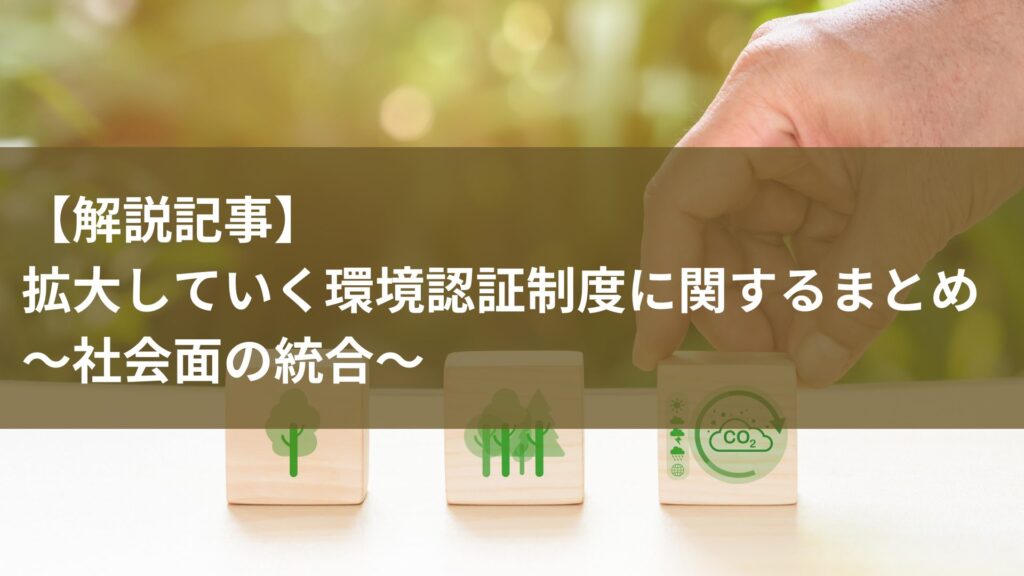INDEX
As efforts to realize a sustainable society are called for worldwide, companies and consumers are becoming increasingly conscious of environmental considerations. The certification system that has historically developed in this context is the "environmental label," which indicates the environmental friendliness of a product or service. Environmental labels are marks that indicate that environmentally conscious designs and processes have been adopted for products and services. In recent years, the social certification aspect has become increasingly important, as people have become more concerned not only with these environmental aspects but also with social aspects such as the protection of workers' rights.
This paper will explain the significance of using certification systems in corporate activities, in the form of a summary of environmental and social certifications.
Table of Contents
Overview of Environmental Certifications and Environmental Labels
Classification of Environmental Labels
Introduction of Social Aspects in Certification
Benefits of Environmental and Social Certification
Environmental and Social Certifications Notes
A certification system that also takes into account the social aspects that are evolving
summary
Overview of Environmental Certifications and Environmental Labels
Environmental certification has a long history of global development in response to increasing international interest in climate change. In particular, there are many "environmental labels" in Japan and around the world that provide consumers with reference information on environmental protection when selecting products for their consumption.
An environmental label is "a mark or marker that tells us how a product or service contributes to reducing environmental impact" (Ministry of the Environment). Environmental labels can be divided into two main types of information provision methods (ZEROC).
Marks that indicate that the product or service contributes to the reduction of environmental burdens (Marks, etc.)
Organize and provide information on the environmental impact of goods and services (display/provide environmental impact data)
Environmental labels are closely related to our daily lives in a wide range of areas, including products, packaging, and restaurant signage. A typical example is the "Recycled paper use mark" granted to products that use used PET bottles.PET Bottle Recycling Recommendation MarkThe Ministry of the Environment of Japan (MOE) has announced that the Ministry of the Environment has issued environmental labels from a wide range of sources, from "national and third-party organizations," "business associations," and local governments to foreign countries. According to the Ministry of the Environment, environmental labels are issued by a wide range of sources, from "national and third-party organizations" and "business associations," to "local governments" and "foreign countries.
Classification of Environmental Labels
The main environmental labels in operation around the world are broadly classified by the International Organization for Standardization (ISO) into the following three types
*There are also environmental labels that do not fall into these three types.
| type | Description. |
| Type I (third-party certification) | An independent third-party organization evaluates and certifies the environmental impact of a product over its entire life cycle. In Japan, a representative example is the "ecological markThe following is a list of It is specified in the international standard ISO 14024. Internationally, the Germanblue angelfish (Holacanthus isabelita)is the world's first environmental label certification system. |
| Type II (self-declaration) | It is a voluntary declaration by a company of its environmental considerations concerning an aspect of its products. It is an environmental claim made by a company, so it is important to clearly disclose the basis for the information. |
| Type III (Environmental Information Disclosure) | It is a quantitative data representation of the environmental impact of a product, such as carbon footprint and eco-efficiency, etc. It is specified in ISO14025. In Japan, the Japan Environmental Management Association for Industry (EcoLeaf environmental labeling systemIn other countries, the Swedish government supports the "Swedish Government Support Program. In other countries, the Swedish government supports the "Product Environmental Declaration (EPD)The first is the "M" in the "M" column. |
Type I and III both require certification by a third-party organization, while Type II is based on self-declaration and may be considered a kind of disadvantage in terms of credibility of information. Type II, however, allows for a flexible system design that allows companies to claim voluntary methods and rationale, and is expected to have a public relations effect by demonstrating sensitivity to the antennae of consumers, whose environmental awareness is on the rise.
The difference between Type I and Type III is that Type I applies to products and services that meet the acceptance criteria of a third-party organization, while Type III judges and certifies whether the "quantitative data" is correctly calculated. From this point of view, the final decision on Type III will be left to the consumer.
Introduction of Social Aspects in Certification
From the perspective of "sustainability," concepts that take into account not only the environment but also social and economic aspects are beginning to attract attention. As a result, the nature of environmental labels is changing. One such change is the integration of social aspects into existing certification schemes. Green purchasing, in which purchases are considered in light of environmental considerations (Ministry of the Environment) concept, the importance of environmental labels that integrate social aspects (human rights, labor environment, etc.) has recently been academically found through interview surveys (Rubik, Prakash and Riedel, 2022).
The Japan Environment Association, which operates the Eco Mark, the only third-party certification in Japan, has introduced an initiative to promote the social aspects (human rights, labor, etc.) of companies from April 2021. This is a self-assessment system through the distribution of a "sustainability checklist" to Eco Mark certified businesses and organizations. This means that applicants for Eco Mark certification (not including affiliated companies, supply chains, etc.) are required to check their compliance with labor-related laws and regulations and report any violations to correct them (Japan Environment Association). Certification systems that take social aspects into account have already begun to be utilized mainly in Europe, and the Eco Mark system has begun to be introduced in reference to this trend.
JEMAI has set the scope of evaluation of social initiatives in Eco Mark certification with the aim of "promoting social initiatives in the business activities of certified businesses as a complement to product certification" (Japan Environment Association). Therefore, the scope of analysis of social aspects is meant to be limited to "direct activities" of both elements of "Eco Mark products" and "activities related to the entire business", and social effects and indirect activities regarding other products and consumption are excluded from the scope.
In today's society, where the concept of a sustainable society is evolving, certification systems that focus not only on environmental but also social aspects are expected to become increasingly important and provide significant benefits to companies and consumers alike.
Benefits of Environmental and Social Certification
The benefits to a company through the use of a certification program are manifold. If the relevant certification is granted to a product, it is expected to "improve the credibility" of the product itself and "enhance its market competitiveness". In the case of certification of the company itself, it can also lead to "promotion of sustainable growth" and "improvement of investors' evaluation" as it implies an external evaluation of the company's management policy.
| Advantages | Description. |
| Improved reliability | Certification provides third-party assurance that a company's products and services are environmentally and socially responsible. This increases the credibility of the company's products and services with consumers and business partners, and enhances the value of the company's brand. |
| Strengthen market competitiveness | Certification allows companies to differentiate themselves from their competitors. Because consumers are more inclined to choose products that are environmentally and socially conscious, products from certified companies are more competitive in the marketplace. |
| Promoting Sustainable Growth | Through the certification process, companies can identify areas for improvement for sustainable management. This allows companies to reduce their environmental impact, improve their working environment, and increase their overall sustainability. |
| Improved reputation with investors | For investors who value sustainability, companies with environmental and social certifications are attractive investment targets. This facilitates access to capital and helps companies grow. |
Environmental and Social Certifications Notes
Although environmental and social certification has many advantages for companies, it is also necessary to pay attention to some points to be considered. In particular, the "cost" and "time and resources" of the certification process cannot be ignored. In addition, "compliance with standards" to be certified requires ongoing action. These certifications are expected to have a long-term perspective, since their continued use will be recognized by consumers. Finally, the gap between the "market expectations" held by consumers and investors must also be considered. In the face of the large number of existing certifications, it will be necessary to discuss internally which certifications to adopt.
| important point | Description. |
| Cost of certification | In order to obtain certification, there are costs associated with evaluation and auditing. These costs can be especially burdensome for small and medium enterprises. Therefore, cost-effectiveness should be fully considered. |
| Investment of time and resources | Certification requires a lot of time and resources. It requires a company-wide effort to review and improve internal processes, collect necessary data, and train employees. |
| Compliance with certification standards | In order to maintain certification, the company must remain in constant compliance with the certification standards. This includes regular evaluations and audits, with the risk of revocation of certification if standards are not met. |
| Gap with market expectations | If the expectations of consumers and investors do not match the content of the certification, the certification may have the opposite effect. For example, if consumers do not fully understand what the certification represents, they may perceive it as a disappointment. |
A certification system that also takes into account the social aspects that are evolving
As mentioned above, certification systems, including environmental labels, have developed to integrate social aspects. This presentation will introduce the current status of social certification systems by presenting examples not only from Japan but also from around the world.
| Certification Name | Year Established | home (i.e. hometown, home country) | detailed explanation |
| Eco Mark Certification | 1989 | Japan | It is the only official third-party certification in Japan, operated by the Japan Environment Association, and is the first environmental labeling system in Japan, launched in 1989. It is one of the earliest certifications of its kind in the world, and is a member of the World Eco-Labeling Network, an organization of environmental labeling agencies responsible for promoting and improving the quality of the environmental labeling system in Japan. In recent years, the "Sustainability Checklist" has been made available to Eco Mark adopting companies for the purpose of evaluating their efforts in social aspects (labor and legal compliance). |
| CARE Certification | 2023 | Japan | It is a private certification system established in 2023 by the Institute of Metrology and Sustainability. The purpose of this system is to provide an appropriate evaluation of products and services in terms of their working and natural environments. It differs from Eco Mark certification in that it includes both direct and indirect supply chains. |
| EcoVadis | 2007 | France | We are an evaluation company established in France in 2007. The company mainly provides evaluation services for buyers to assess the CSR policies, measures, and performance of supplier companies. It is unique in that it evaluates companies, not products. It has established a comprehensive evaluation system that includes not only financial aspects but also a wide range of other factors, such as labor practices and human rights, ethics, and the impact of sustainable material procurement, as well as environmental aspects. |
The following are mainly "federations" that do not grant certification, but aim to share the Code of Conduct among participating companies.
| organization name | Year Established | origin | Objective. | Key Features |
| Sedex | 2001 | United Kingdom | Promote sustainable corporate activities that take into account the social and environmental aspects of the company and its entire supply chain | Creation of the world's largest electronic online platform, providing participating companies with the tools to analyze both social and environmental aspects in one centralized location |
| RBA (Responsible Business Alliance) | 2017 (name change) | America | Promoting Responsible Corporate Behavior in Global Supply Chains | Programs focused on labor, ethics, environmental, and health and safety standards |
Thus, certification systems that take into account social aspects have emerged since the beginning of the 21st century. In the future, it will be important for Japanese companies to appeal to consumers by actively adopting these certification systems.
summary
Environmental labels and social certifications play an important role in today's world, where efforts to realize a sustainable society are required. Environmental labels evaluate the environmental impact of products and services and demonstrate their consideration to consumers, and are classified as Type I, Type II, or Type III according to ISO standards. This allows consumers to make environmentally conscious choices based on reliable information.
In recent years, social certification has become increasingly important, not only for environmental aspects from the standpoint of sustainability, but also for social aspects such as working conditions and human rights protection. The Japan Environment Association, which operates the Eco Mark, is developing social certification of the product owner itself. Its main target is the realization of sustainable corporate activities through corporate self-assessment. On the other hand, the CARE certification, although the evaluation target is the same in that the product itself is the subject of the certification, is pursuing a form of social certification that expands the viewpoint to the supply chain.
Environmental and social certifications have many benefits, such as increasing credibility, enhancing market competitiveness, promoting sustainable growth, and improving investor recognition. On the other hand, certification requires an investment of cost and resources, and there are caveats such as compliance with certification standards and gaps in market expectations.
These certification schemes are important tools for companies to achieve sustainable management and earn the trust of consumers and investors. It is hoped that companies will actively adopt eco-labels and social labels to increase transparency and credibility, thereby contributing to building a sustainable future. The development of certification systems that fulfill both environmental and social responsibilities will be required in the future.
aiESG has developed a tool to analyze the environmental and social sustainability of a company's activities. If you are a company interested in analyzing the sustainability of your business, going back through the supply chain, please contact us.
Contact us:
https://aiesg.co.jp/contact/
Related page
Report List : Regulations/Standards
Commentary] Overview of the European Corporate Sustainability Due Diligence Directive (CSDDD) and its Amendments
Understanding the European Corporate Sustainability Due Diligence Directive (CSDDD): Mandatory Assessment of Adverse Effects on Human Rights and the Environment
Commentary] Non-Financial Capital: Trends in Human and Natural Capital - Disclosure Regulations and Guidelines in Japan and Overseas
The Importance of Social Aspects in Nonfinancial Information Disclosure
Commentary] Alphabet Soup - Disruptions and Convergence of Sustainability Standards
















